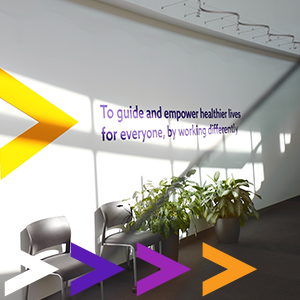Behavioral health care is health care

For many, finding support for a behavioral health condition combined with the complexities of navigating a convoluted health care system can be overwhelming, and lead to a list of unmet health needs. Over half of U.S. adults living with a mental illness do not receive treatment – and even in states with the greatest access to health care, nearly one in three youth are going without treatment.
And with the number of comorbid mental and physical diseases increasing dramatically over the last two decades, the need for a holistic path of care is of vital importance.
Benefits of an integrated care model
At Point32Health, we, alongside our family of companies, are committed to expanding access to quality care and providers. As the COVID-19 pandemic continues to induce the nation’s behavioral health crisis, we are also focused on examining how behavioral and medical care can work together to successfully treat the whole person.
Our vision for the way forward is an integrated care model that connects the individual with the right level of care for their needs at the right time – and through every stage of life.
“More than ever before, there is a need to deliver integrated care, which really means the member is at the center, and every facet of their care team works with one another to better their health,” said Patricia Howard, chief operations officer. “This end-to-end operating model allows information and insights to flow seamlessly so that from the moment a member receives a diagnosis, to their discharge paperwork and outpatient care, they feel supported in their care journey. Whole person care integrates providers, information technology and data, clinical innovations, programs and community support to better manage their whole health.”
Patricia goes on to explain that an integrated care model enhances the experience for members and providers alike, where there is a single point of contact for medical and behavioral care needs. In-house clinical teams can share expertise more readily by using the same information systems to monitor, facilitate and collaborate a member’s care path. And lastly, it strengthens partnerships with innovators in the community who are pushing the status quo when it comes to behavioral health programs and resources that take a whole-person approach to care.
Expertise to support the whole person
“We recognize the path of care looks different for every individual,” said Jill Borrelli, LISCW, vice president of behavioral health at Point32Health. “Especially when it comes to behavioral health. A person may have a more successful response to cognitive therapy than group therapy, or a virtual visit versus a coaching session with a paraprofessional – our role is really to help bring those innovative services and programs forward so that members have a range of options to choose from based on their needs. And the team that helps bring this to life is our behavioral health team, made up of a multi-disciplinary group of leaders who bring their unique expertise and clinical backgrounds to the decision-making table every day.”
The behavioral health team in action
Massachusetts’ state data from August 2021 reports the average length of an Emergency Room (ER) stay for patients was more than five days. “The COVID-19 pandemic really has been a catalyst to the Emergency Department (ED) boarding crisis in Massachusetts,” said Jill. She adds that the crisis required our members who needed inpatient psychiatric treatment to experience lengthy wait times in emergency rooms due to there not being enough psychiatric beds.
In response, we created an ED Boarding Team at Point32Health, committed to working with emergency service providers, state agencies and local hospitals and facilities to get members admitted as quickly as possible. The team is made up of a behavioral health medical director, a manager and supervisor and other clinicians working as a group to address the barriers members are facing when it comes to treatment and to find solutions so that they can get the care they need as quickly as possible.
Another unique facet of colleagues within the behavioral health team is the community health workers, who are certified in their communities as experts to help community members understand the resources available to them. Community health workers reach far beyond typical behavioral and medical health support – whether it’s help with housing, nutritional needs, educational support for their child or help with employment, a community health worker can meet the member where they’re at in terms of what support they need most.
As the pandemic continues to take a toll on the mental health of children and adolescents, our behavioral health team is here to help them and their families understand what services are available to them. Our licensed clinicians manage all child and adolescent outpatient services, ranging from intensive home-based services to mentoring, ensure that our child and adolescent members are getting what they need to keep them healthy and safe during this difficult time.
“Right now, what kids need are lines of support, someone paying attention to them, so that if they’re exhibiting any signs of anxiety or depression, someone is there to help guide them,” said Jill Borrelli. “And in addition to talking to a school counselor or pediatrician, parents and guardians can always call their health plan for help.”
Resources and care for the whole person
Harvard Pilgrim Health Care and Tufts Health Plan are Point32Health companies. Members can learn more about what behavioral health resources are available to them.

